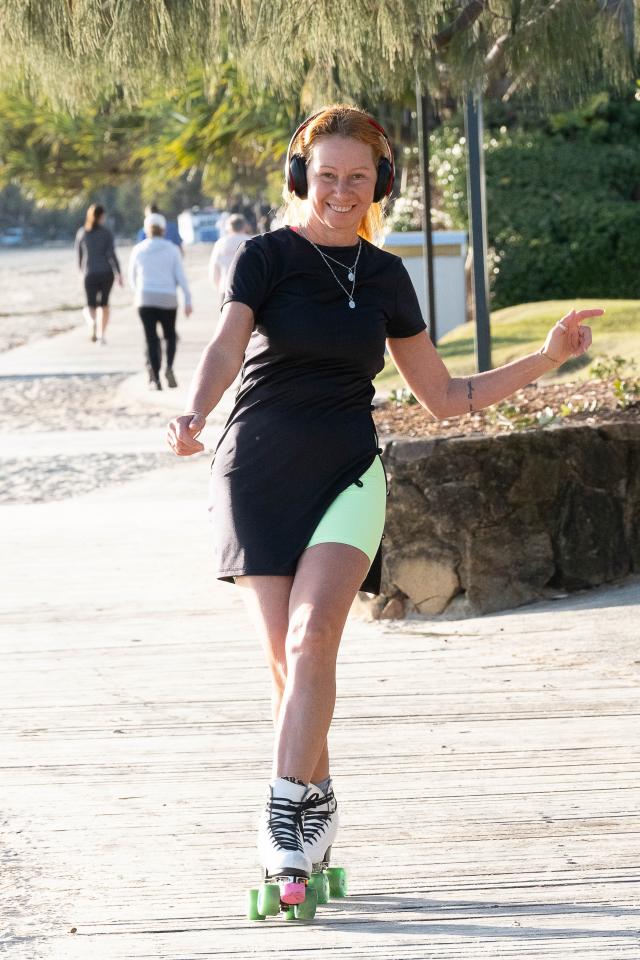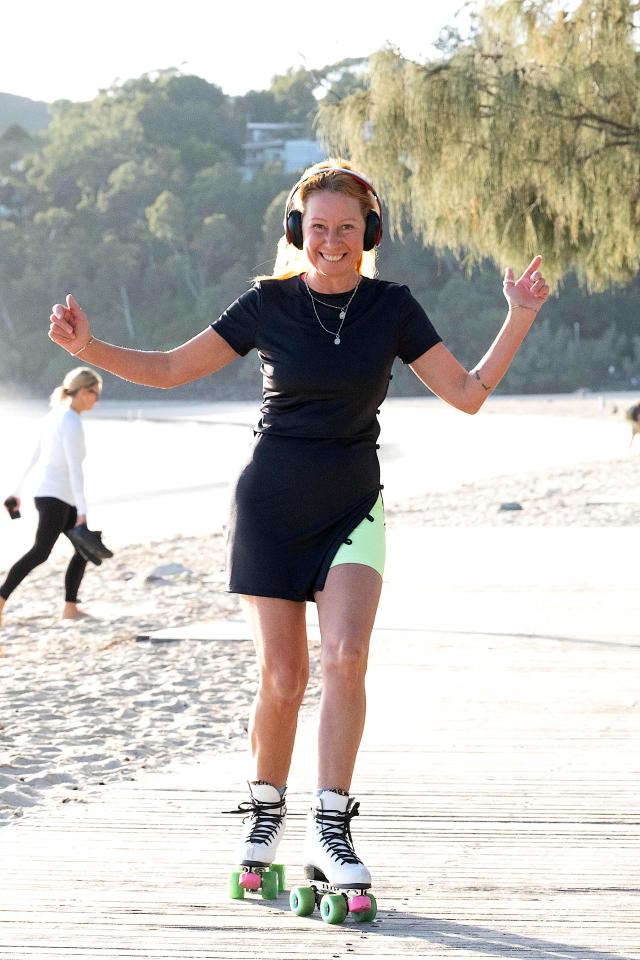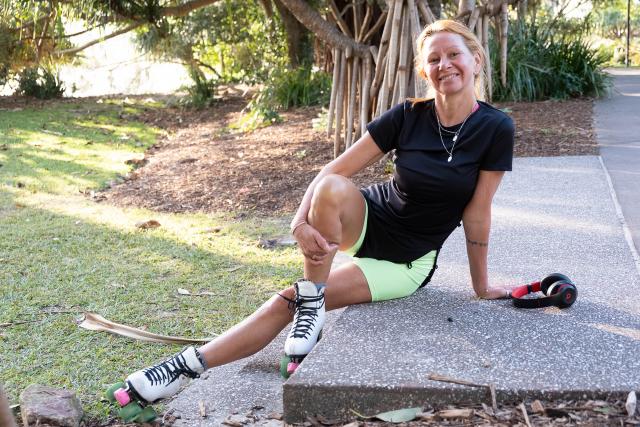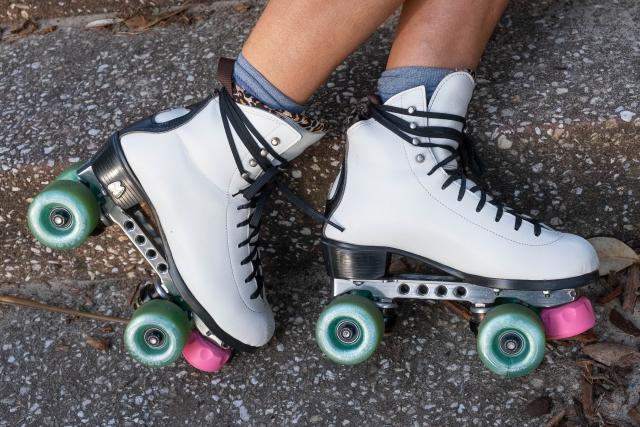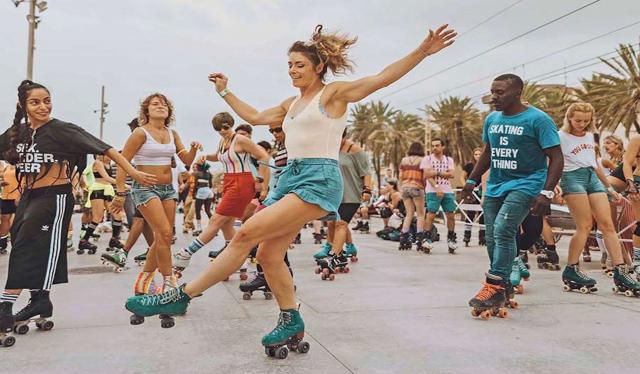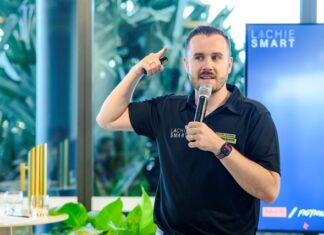Here she comes, the whoosh of her retro roller skates heralding her appearance around the bend of our street for what is it? – the 20th or 30th time this morning – and then Oxana Victoria Bell is speeding past our apartment, a blur of graceful movement and dreamy smiles, her head dipping to the beat of whatever is coming through her headphones.
Oxy, as she prefers to be known, is in her happy place.
From my upstairs office overlooking the street, I’ve watched her skate by with such style and grace these past few months and often wondered where she learnt to skate like that. Was she an elite skater in training for a big event? Has she trained like this – up to four hours a day in two sessions, morning and late afternoon – all her life?
I needed to know and one morning last week I marched out onto the road as she came into view and put one hand up in a stop sign and waved the other in a slow-down gesture. She smiled as she came by at speed and slapped my stop-sign hand in a high five. Next lap I blocked her way and she clicked heels as she came to an elegant halt. “I’m so sorry,” she said. “Am I making too much noise?”
I told her I was a nosy journalist and wanted to hear her story, and invited her for coffee the next morning. This is what she told me.
She was born in a small village in Russia in 1968, back in the Cold War days of the Soviet Union, to a Ukrainian father and a Russian mother. “The name they gave me is Ukrainian and Ukraine was part of the Soviet Union,” she explains. “Where I grew up was Russia but we were all mixed up, you see. We loved the Ukrainian dances and the colourful costumes, and we were like one big family. We were very poor, like most normal Russian families, and our house was very basic, but my mother, Galina, had always wanted to be a skater, and if she couldn’t achieve that ambition, she wanted me to.”
Working long hours at her job to put away some extra money, Galina enrolled Oxy into an Olympic standard skating school when she was just four. The little girl loved it from the start, and showed real talent. But the ice rink was a 40-minute train ride away from their village, and each lesson was two hours, meaning that Karina had to somehow find four hours away from work to be with her.
When Oxy was six and regarded as the best in class for her age, Galina’s work obligations meant that she could deliver the little girl but not bring her home. With strict instructions about where to catch the train and where to get off, Oxy made her way across town and became hopelessly lost. Her mother found her wandering the streets with tears in her eyes late that night. That was the end of the Olympic skating school.
What about roller skating, I ask? By the early ‘70s, it was enjoying a huge revival in the West. Not in Russia? “I had seen some other kids roller skating but not where we lived. The roads around our village were too rough, and although I had a pair of snow skates, there was just nowhere I could do that either. I loved skating, just loved it, and I was good at it, and it broke my heart to stop.”
In her teens, Oxy took up athletics and became a good distance runner, competing at representative level in several marathons. But her heart was elsewhere. She remembers running around the track dreaming of her skating days, when she could glide over the surface rather than pound it with her feet. But her track and field days finished at 19, when she married a boy from the village.
The union lasted eight years before it fell victim to her husband’s alcoholism, the bane of so many Russian working class communities. At 27, Oxy became a single mum to a young daughter and son. But she was a survivor. She found a good office job and managed to put away a little money, and she started visiting on-line dating sites.
She tells me: “I didn’t care where the man lived because I was lonely it was only for an on-line relationship anyway. And then I met a man called David Bell who lived in New Zealand. I didn’t even know where that was!” Two years later David, a divorced, middle-aged dad, flew to Moscow and made his way to Oxy’s village. They clicked. She recalls: “It was crazy I know, but he was so nice and he convinced me to move across the world to a place I knew nothing about. The kids were nine and 11, and they didn’t know what to think. But off we went to New Zealand, and it was wonderful.”
David and Oxy bought a café north of Auckland on Highway 1 near Whangarei. She recalls: “It didn’t make much money but it gave us a wage and our lifestyle was great. The beach wasn’t far away and the kids could work in the café with us at the weekends. In fact my daughter learnt to make coffee much better than me.”
About a decade ago the Bells bought a holiday unit in Noosaville and started making annual pilgrimages. And then Covid hit and New Zealand went into a severe lockdown that more or less lasted two years. Says Oxy: “We couldn’t travel, we couldn’t even go to the beach. I didn’t really know what to do to exercise, but I looked on the web and I saw these skates advertised on a surf shop site. Seeing them brought back all these memories of when I was a little girl in Russia, and mum was so proud of how well I was skating. I was good! At six I could do jumps and other routines. So I thought of all this, and I decided to go back to skating nearly 50 years since I gave it up.”
In fact Oxy was belatedly catching up with a roller skate revival that had been taking the world by storm for about a decade, emanating from California’s Venice Beach and Long Beach and fuelled by social media. I remember first becoming aware of the retro freestyle phenomenon when the irrepressible surf champ Layne Beachley made a spectacularly skatey entry to her 40th birthday party at Hugo’s on the Manly Pier in 2012. Since then it has only grown.
As Mashable website noted in 2020: “Roller skating’s recent online revival swept across digital channels like a 1950s waitress at a drive-in diner. Harkening back to images of romanticized Americana throughout the ages, the en vogue quad skating aesthetic that now dominates Tik Tok, YouTube, and Instagram is fuelled by the nostalgia for bygone eras, from your parents’ disco to your own childhood roller rink birthday parties.”
Now that David has retired and the kids are all grown, the couple is living full-time in Noosaville, where Oxy skates every day. She is no slave to skatey fashion or its social media, but she follows it. She says: “My skating hero is Estro-Jen, the founder of Moxi Skates, which I use. I follow her on Instagram. She’s very powerful. I also follow some girls from Long Beach, where they have a wonderful skate park for freestylers.”
But in truth Oxy is more interested in actual followers than online ones. She says: “What I do is free, I do my own thing. I go this way, I go that. I like it when kids follow me. I do Instagram and ask them to follow me. I would like to encourage kids to skate like I do instead of sitting inside playing computer games all day. David has five grandkids and when we see them they’re all skating with me now. I love that.”
Although her father died some years ago, Oxy is still in regular contact with his family in Ukraine, and with mum Galina, now 82, in Russia. She doesn’t hold back when asked about the tragic conflict affecting the family. “We communicate with both sides and it is so terrible, what is happening. Putin should have been put in jail 10 years ago. I am Russian but I hope Ukraine wins the war, like 90 percent of Russian people.”

